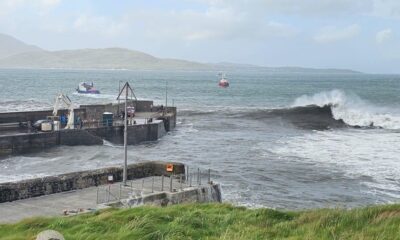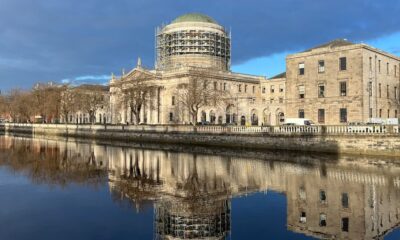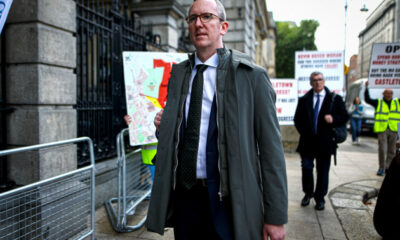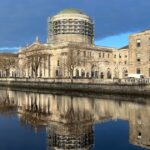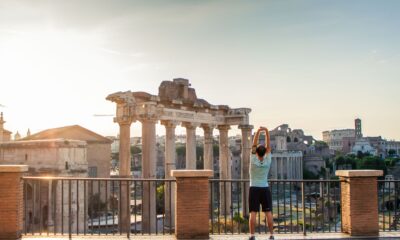Opinion
The Guardian view on Trump’s support for Ukraine: a welcome but not reliable vote of confidence | Editorial
Read more on post.

The judgment of a man who fails to distinguish between aggressor and victim when describing the Russia-Ukraine war is not worthy of respect. Unfortunately, when that man is the US president, his opinion cannot be ignored.
Earlier this year, Donald Trump asserted that Vladimir Putin had “all the cards” and urged Volodymyr Zelenskyy to make peace in terms that resembled surrender. This week, Mr Trump declared that Kyiv might achieve total victory, liberating all territory currently under Russian occupation.
This assessment follows a process described by the president as “getting to know and fully understand the Ukraine/Russia military and economic situation”. Mr Trump offered to continue supplying American weapons for Nato “to do what they want with them”. Asked about Russian incursions into airspace over alliance members, the president suggested the offending jets could be shot down. This was later qualified as a prescription to be followed only “if they’re attacking”.
Given Mr Trump’s capacity for hyperbole, self‑contradiction and spouting nonsense, it is hard to evaluate the significance of his sudden enthusiasm for Ukrainian liberation and gung-ho attitude to Moscow’s military provocations.
It is not wholly new. His attitude to Mr Zelenskyy has evolved quite gradually, and with assiduous encouragement from European leaders, from contempt to courtesy and now something like respect. With Mr Putin he has veered from credulous admiration to wary patience to tetchy frustration and back again. He has set deadlines for the Kremlin to stop the killing or face more robust sanctions, and failed to follow through. Asked this week whether he still trusted the Russian president, Mr Trump said he would know in a month’s time.
Judging by recent precedent, that leaves ample scope for yet another shift in position; another round of craven indulgence for Kremlin narratives about the war.
Such inveterate unreliability makes it hard to divine motive in the White House. Sincere interest in protecting democracy against authoritarian attack and strategic investment in the security of the US’s historical allies are, sadly, not plausible explanations. They wouldn’t be consistent with Mr Trump’s ongoing assault on the US’s own constitutional order, or with his well-attested tendency to see everything through the lens of ego and self-aggrandisement.
In that context, the likelier reason is ongoing determination to earn plaudits as a great peacemaker, coupled with belated realisation that Mr Putin will not end a war that he still believes he can win. Having tried to bully Ukraine into capitulation, Mr Trump may now be attempting something more like deterrence – ramping up the cost of the war for the Kremlin to see if that moves the dial towards a ceasefire.
If so, it is certainly a better plan than appeasement, which only encouraged further aggression. Mr Trump’s assessment of the balance of strength on the battlefield is more optimistic on Ukraine’s behalf than most independent analysis, but it would also become self-fulfilling if followed up with sufficient military aid. The same applies to his gloomy prognosis for Russia’s economy if tougher sanctions are expedited.
If Mr Trump is indeed converted to the cause of maximising pressure on the Kremlin as a means to end the war, it is a transformation that Kyiv’s more stalwart allies should welcome but cannot rely upon. It presents a strategic opportunity to be seized and maximised on the understanding that it may not last.
-
Do you have an opinion on the issues raised in this article? If you would like to submit a response of up to 300 words by email to be considered for publication in our letters section, please click here.
Opinion
High seas drama: Áine Ryan on a Tory Island ferry crossing she would rather forget
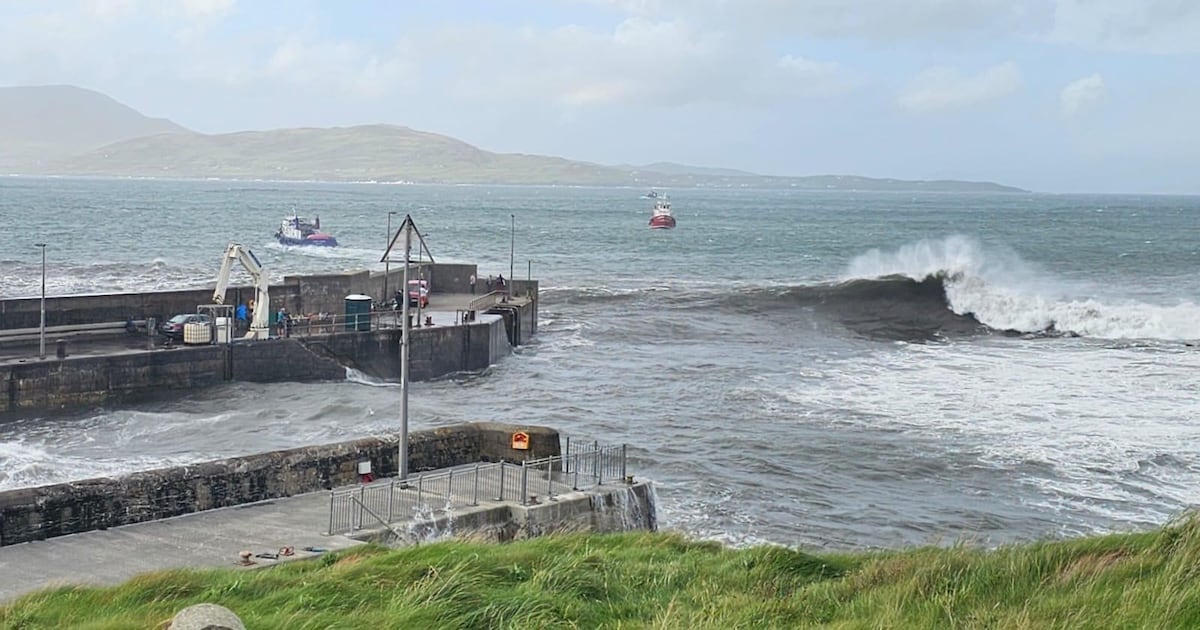
Read more on post.
It’s hard to believe it is 30 years since we were weather-bound on Tory Island. It was mid-August 1995 and a group of us from a less exposed island down the coast had decided to explore this outpost off Donegal. Part of the attraction was that it still boasted a monarchical regime whose king may not have worn a crown but boy could Patsy Dan Rodgers, the King of Tory, make music and talk the talk.
Of course, we had an anointed leader of our community with us too: The Priesht, who for the sake of diplomacy shall remain anonymous due to certain shenanigans on the deck of the boat on our return journey to Magheroarty.
The memory of that summer sojourn and the number of 16-hand reels and singing sessions until dawn came bouncing back during a recent rocky August voyage from Clare Island, my home for a time.
Ironically it happened to be on the same ferry, the Tormore, which was the Tory ferry in the mid-1990s but is now among the fleet of ferries servicing the Co Mayo island.
It was two days after Storm Floris swept in across the horizon and the seas were still recovering from her wrath. No surprise that the unseasonable weather had caused campers to run for shelter, day-trippers to cancel their planned voyages, islanders to batten down the hatches and boatmen to tighten their ropes and check their anchorages.
It also ensured that this long-time nervous sailor was hyper-vigilant of the trajectory of the storm as I obsessively checked all the apps from Wind Guru to Magicseaweed and, of course, our very own Met Éireann.
Two days later I was armed in rain gear and a look of terror on my face as I boarded the ferry with the tail end of Floris still blowing gusts of up to 65km/h.
As always, in rough sea conditions, I am more than happy to make a holy show of myself. So on this occasion I sat inside the door of the cabin, threw my arms over the back of the seat in front of me, bent my head, closed my eyes and started box-breathing.
The journey from Clare Island to the mainland is usually about 30 minutes but on occasions when the sea is lumpy and the wind is belligerent, the wise skippers “tack” into the wind or run from it, meaning the voyage is a little longer.
Every 10 minutes or so I rose from my crouched position and peered out the porthole to check for the welcome sight of land. The relief was short-lived when I finally saw the outline of the cliffs which frame Roonagh.
Suddenly, our craft slowed down and drew to a halt. Apparently, there was swell rolling into the little harbour and another island ferry, the Clew Bay Queen, was inside tied up to the pier. For safety, we needed to wait outside until she exited.
Lord almighty but that was a long 15 minutes as the Tormore’s engines revved and screeched and rocked and rolled under the cliffs awaiting a safe passage inside to the pier.
To make matters worse, what do you think swam across my memory but the trauma of that very rough voyage from Tory?
Unlike Clare Island, with its big hill, An Cnoc Mór, Tory is low-lying, nine miles off the coast and has little shelter from the whims of the ocean.
[ Saving the best for last: How the Making In symposium left an indelible markOpens in new window ]
Back in August 1995 when the winds suddenly blew up and word spread about the ferry being cancelled, we gave little thought to it. The craic was too good. There was another night of madness to be enjoyed.
However, when bleary-eyed and sleep-deprived the following morning we were told the Tormore would be departing for the mainland an hour later, it was a whole different story.
Ironically, it was us islanders who were the worst passengers. Being seasoned sailors, it must have been the experience of an ocean which appeared to have a very different modus operandi when attacking our northern coastline with strong winds. Certainly the other tourists who knew little about the Atlantic’s vagaries appeared more sane than our gang.
Turns out it wasn’t a very good idea for The Priesht to have indulged in a full Irish breakfast. Half way across he provided an entertaining spectacle of kneeling on the deck, vomiting into a bucket while one of our group threw a towel over his head, for modesty’s sake.
Every now and then he’d peep out from under his cowl and cause much mirth, shouting: “Well, that’s the fried egg” and “Here comes the black pudding.”
Three decades later with my stomach hovering in my throat, my sense of relief was visceral as our ferry turned into the pier and the crew tied its ropes.
Afterwards, I stood overlooking the pier and watched the Tormore bounce back out of the harbour with her new load of passengers. This sturdy craft has carried islanders and visitors along the wild west coast in all sorts of weather but for this seafarer the Beaufort scale must be in a benevolent mood with high pressure dominating and I don’t mean my heart rate.
Opinion
How to take the fight to Reform UK and the far right | Letters
Read more on post.

Jonathan Freedland’s analysis of the threats posed by a Reform UK government is spot-on (Trump has dragged the US to the abyss and Nigel Farage would do the same to Britain. Here’s how to stop him, 19 September). We only have to look to Trump’s America to get a pretty clear idea of what it would mean.
Freedland is also correct in his analysis of the level of support for Reform and Farage’s key policies. They do not receive anywhere near majority support: only 31% of voters support Brexit, as against 56% who want to rejoin the EU; nearly 60% want to stay in the European convention on human rights; only 31% believe migrants have undermined British culture. Yet Freedland inexplicably fails to invoke the most obvious solution to the rise of rightwing populism: reform of our voting system.
Although the most recent YouGov poll shows Reform on 28% and Labour on 20%, it also shows all “progressive” parties on at least 49% against 45% for Reform and the Conservatives combined.
Isn’t then the obvious answer to adopt a voting system that reflects voter preference? Keir Starmer has ignored the votes of Labour conference on this, and he could be forgiven, with a huge majority on roughly a third of the vote. But would Labour be so happy if the boot were on the other foot: a Reform government with 30% of the vote? Surely, the answer is a voting system that gives voters policies they actually vote for.
Barry Greatorex
Derby
My blood ran cold reading Jonathan Freedland’s piece, because his summary was so distressingly accurate. The Trump aide Stephen Miller’s remark that the Democratic party is a “domestic extremist organisation” was particularly chilling. How long before it is banned and the US becomes a truly authoritarian one-party state?
So what to do? For a start, the message should be rammed home: “Vote Farage, get Trump”, because if our current leaders are conciliatory, just imagine how supine Reform will be as the US increasingly interferes in other countries’ domestic politics.
Jennifer Rees
Cardiff
On the printed page of the Journal section, Jonathan Freedland’s call to expose the supposed popularity of far-right propaganda was placed next to your editorial on the importance of grassroots drama training. It is often working‑class actors who bring plays to the stage or screen that shift public consciousness, for example, about misogyny or the Post Office scandal.
What we need now are powerful dramas about the rise of reactionary populism and its seductive influence on so many people who do not regard themselves as – and are not – extremists (‘Go-to trope’: how the far right is exploiting violence against women and girls, 19 September).
Dr Sebastian Kraemer
London
I have sent a postcard to Nigel Farage to say that I do not need his protection.
Elizabeth Baker
Birmingham
Jonathan Freedland’s article about protecting democracy states that we all need to take action. I agree, but can he suggest how? I am happy to attend protests, but what else can I do? There is a certain feeling of individual helplessness attached to this situation.
Marilyn Adams
Bristol
Opinion
Doctors’ tribunals are in need of urgent reform | Letter
Read more on post.

We are gravely concerned by news that doctors found guilty of rape and sexual predation have been allowed to return to medical practice after Medical Practitioners Tribunal Service (MPTS) hearings (Report, 18 September). This raises crucial questions about the independence, processes and ethical integrity of the MPTS and its ability to protect public health and promote trust.
A fundamental conflict of interest is the MPTS’s funding, which comes indirectly from doctors’ fees, via the doctor’s regulator, the General Medical Council. The use of subjective mitigating factors, such as “character references” and “showing remorse” can also advantage doctors.
In sharp contrast to these sexual misconduct cases, doctors participating in peaceful protests over the health harms of global heating, in accordance with overwhelming scientific evidence and their GMC-defined professional responsibility to protect public health, have faced prolonged suspensions and potential removals from practice. Yet their actions neither endanger patients nor reflect on their clinical competence.
These inconsistencies are further challenged by research the GMC itself commissioned, which found that public trust in the profession was determined primarily by whether a doctor had intentionally harmed someone, rather than the legality of their action.
To keep patients safe, disciplinary processes require urgent reform. This includes separating funding and governance structures, specialist training for tribunal panels (in, for example, trauma-informed care and the climate and health emergency), objective criteria for determining sanctions, transparent reporting, and comprehensive support for complainants.
Prof Hilary Neve
GP, Plymouth
Dr Rammina Yassaie
NHS doctor and ethicist, Leeds
Annie Mitchell
Chartered psychologist, Newton Abbot, Devon
-
Breaking News1 day ago
Barack Obama to be conferred with freedom of Dublin at ceremony on Thursday
-
Culture1 day ago
Taylor Swift’s new cinema outing generates more than €12million in just 24 hours
-
Culture1 day ago
Milan Fashion Week 2025: Unmissable shows and Giorgio Armani in mind
-
Politics1 day ago
European Parliament snubs Orbán with vote to shield Italian MEP from Hungarian arrest
-
Travel & Lifestyle2 days ago
The Best Way to See Rome? On a Running Tour at Sunrise
-
Business9 hours ago
Households to be offered energy bill changes, but unlikely to lead to savings
-
Opinion2 days ago
Saving the best for last: How the Making In symposium left an indelible mark
-
Culture2 days ago
Marvel stars Mark Ruffalo and Pedro Pascal stand up for Jimmy Kimmel as Disney boycott intensifies


